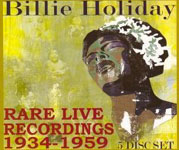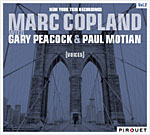Home » Jazz Articles » Album Review » Billie Holiday: Billie Holiday: Rare Live Recordings 1934-1959
Billie Holiday: Billie Holiday: Rare Live Recordings 1934-1959
The release of Billie Holiday: Rare Live Recordings, 1934-1959, offers the opportunity to hear Holiday on the side of history. There is something extraordinarily intimate about the quality of each cut, no matter in what venue, from big band gig to TV or recording studio, film or rehearsal hall. The intimacy clearly reveals her irreversibly certain approach to singing especially when contrasted to a sometimes timid, seemingly fatigued, husky, and frequently slurred speaking voice.
The chronological presentation of the recording is advantageous to hearing the changes her voice underwent. The spark she sets with the Count Basie Big Band from 1937 seems to disappear and the syrupy character of her signature blues delivery begins to take over. Every word she sings is clearly audible and identification with the meaning of the words is absolutely possible. Her precision in accentuation is unrivaled. Over time, a youthful lightness in her voice yields to darkness. Her voice sounds worn and acquires a vibrato. Yet, her voice always conveys an expressiveness that no songstress has ever duplicated.
On the last disk, ESP employs poetic license to create a vocal coda in placing tracks out of chronological order with "Please, Don't Talk About Me When I am Gone," her own "God Bless the Child," and then "Now or Never," from a Basie session. Those songs are so elemental that becoming teary-eyed is easy. Hearing her describe the blues in her introductory remarks with the Roy Eldridge Band in 1957, "You just have to feel it," is a poignant reminder for how to listen.
The repetition of many songs over a period of years offers a sense of how she revisited them. "Porgy" is performed numerous times and progressively injected into the song are subtleties of phrasing and emphasis, changes in tonality and sheer emotion. "God Bless the Child," "Lover Man," "Billie's Blues" and "Them There Eyes" are also among the repeated songs. It is interesting that the anti-racist song, "Strange Fruit," is only presented once, from her 1951 Storyville club session, given that, according to the fairly comprehensive liner notes, it was the most requested song in her concert circuit.
The awesome task of writing about Holiday's music is more than humbling. Writing about a legend is audacious. Chronicling how the legend has been represented is more realistic and these rare live recordings have certainly met the challenge of bringing us nearer to the actuality of Billie Holiday. Yet, however her voice may intoxicate us still brings us no closer to understanding the real woman. Her mystique morphs into mystery.
Track Listing
CD1: Lost My Man Blues; Theme-Moten Swing; Announcer Introduction; Swing Brother Swing; Announcer Introduction; They Can't Take That Away from Me; I Cried For You; Fine and Mellow; Announcer Introduction; I'll Get By; Billie's Blues; Do Nothing 'Til You Hear From Me; Danny Kaye Introduces Jerome Kern, who presents Billie with her award; I Cover the Waterfront; Fine And Mellow; All of Me; Endy Gets Caught Playing the Piano; Endy Goes to Storyville; Do you Know What It Mean to Miss New Orleans; Satchmo Talks; Farewell to Storyville; Farewell to Storyville (Studio Version); The Blues Are Brewin' (Studio Version); The Man I Love; Miss Brown To You; Lover Man; I Wonder Where Our Love Has Gone; Billie's Blues; No More; Good Morning Heartache. CD2: You're Driving Me Crazy; Maybe You'll Be There; Introduction by Donald Wood; You'd Better Go Now; Them There Eyes; Lady Day and Eddie Condon Speak; Keeps On Rainin'; Lady Day and Eddie Condon Speak; Lover Man (Incomplete); I Cover The Waterfront; All Of Me; Narration/Early History; Fine And Mellow; Porgy; Jam Session Introduction; All Of Me; You're My Thrill; Lover Come Back To Me; Ain't Nobody's Business; You're Driving Me Crazy; He's Funny That Way; Miss Brown To You; Lover Man; Them Their Eyes; My Man; I Cover The Waterfront; Crazy He Calls Me; Detour Ahead; Strange Fruit; Ain't Nobody's Business; All Of Me. CD3: Porgy; My Man; Tenderly; God Bless The Child; My Man; Them There Eyes; Lover Man; Willow Weep For Me; I Only Have Eyes For You; My Man; Please, Don't Talk About Me When I'm Gone; Jon McCloughland (Introduction); I Cover the Waterfront; Too Marvelous For Words; Porgy; Them There Eyes; Willow Weep for Me; I Only Have Eyes For You; You Go To My Head; Stormy Weather; Ghost of A Chance; Nice Work If You Can Get It; God Bless The Child; Please, Don't Talk About Me When I'm Gone; Don't Explain; Porgy. CD4: Fine And Mellow; What A Little Moonlight Can Do; Foolin' Myself; Easy To Remember; Moanin' Low; Don't Explain; When Your Lover Has Gone; Mort Saul (Introduction); Ain't Nobody's Business; Willow Weep For Me; When Your Lover Has Gone; God Bless The Child; I Only Have Eyes For You; Good Morning Heartache; Them There Eyes; Billie's Blues; What A Little Moonlight Can Do; Travelin' Light; Lover Come Back To Me. CD5: I Got It Bad And That Ain't Good; Lady Day Speaks - Early History); Just Friends; Lady Day Speaks - The Number 13; Ghost Of A Chance; Please, Don't Talk About Me When I Am Gone - 1; Everything Happens To Me; Please, Don't Talk About Me When I Am Gone - 2; I Don't Want To Cry Anymore; Prelude to A Kiss; Jeepers Creepers; My Yiddishe Mama; Hey! Lady's Here; God Bless The Child; Introduction; Nice Work If You Can Get It; Willow Weep For Me; When Your Lover Has Gone; Billie's Blues; Please, Don't Talk About Me When I Am Gone; God Bless The Child; Now Or Never; Ray Charles Comment.
Personnel
Billie Holiday
vocalsDuke Ellington: piano; Arthur Whetsol, Freddy Jenkins, Cootie Williams: trumpet; Joe Nanton, Lawrence Brown, Juan Tizol: trombone; Barney Bigard:clarinet; Johnny Hodges: alto sax; Otto Hardwicke: tenor sax; Harry Carney: baritone sax; Fred Guy: guitar; Wellman Braud: bass; Sonny Greer: drums; Count Basie: piano; Buck Clayton, Booby Moore: trumpet; George Hunt, Dan Minor, Eddie Durham: trombone; Earl Warren: clarinet; Lester Young, Hershel Evans: tenor sax; Jack Washington: baritone sax; Freddie Green:guitar; Walter Page: bass;
Album information
Title: Billie Holiday: Rare Live Recordings 1934-1959 | Year Released: 2008 | Record Label: ESP Disk
Tags
PREVIOUS / NEXT
Support All About Jazz
 All About Jazz has been a pillar of jazz since 1995, championing it as an art form and, more importantly, supporting the musicians who make it. Our enduring commitment has made "AAJ" one of the most culturally important websites of its kind, read by hundreds of thousands of fans, musicians and industry figures every month.
All About Jazz has been a pillar of jazz since 1995, championing it as an art form and, more importantly, supporting the musicians who make it. Our enduring commitment has made "AAJ" one of the most culturally important websites of its kind, read by hundreds of thousands of fans, musicians and industry figures every month.






















